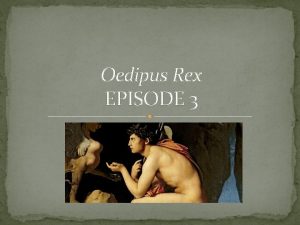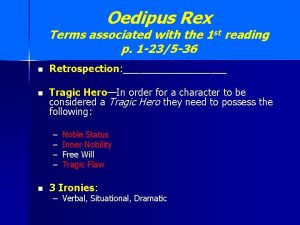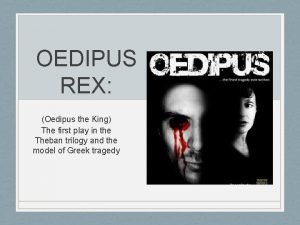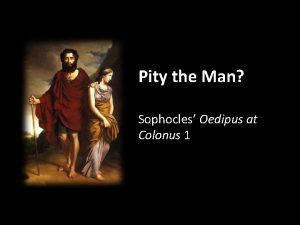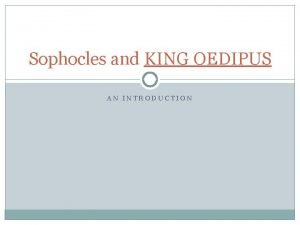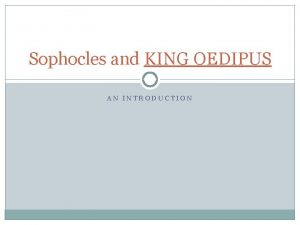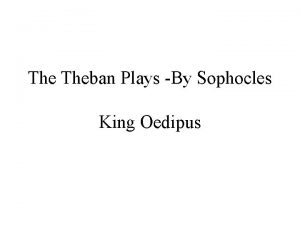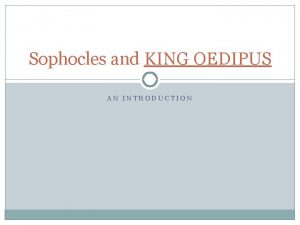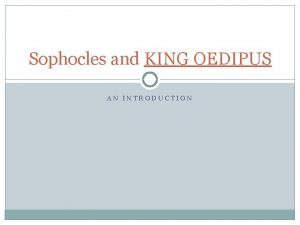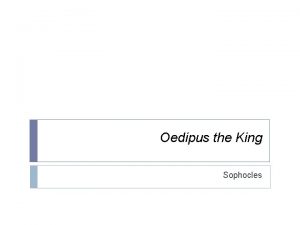Sophocles Oedipus at Colonus 1 116 Prologue 117

![Ground inviolable, on which no one may dwell. The dread [40] goddesses hold it, Ground inviolable, on which no one may dwell. The dread [40] goddesses hold it,](https://slidetodoc.com/presentation_image/ca5f203e191c13b14d8a8134d528eef8/image-2.jpg)
![Athens [108] Hear, you that are called the city of great Pallas, Athens, given Athens [108] Hear, you that are called the city of great Pallas, Athens, given](https://slidetodoc.com/presentation_image/ca5f203e191c13b14d8a8134d528eef8/image-3.jpg)

![Oedipus [143] Do not regard me, I beg you, as a lawless man. Oedipus Oedipus [143] Do not regard me, I beg you, as a lawless man. Oedipus](https://slidetodoc.com/presentation_image/ca5f203e191c13b14d8a8134d528eef8/image-5.jpg)



![Oedipus’ gift Oedipus [385] What, had you come to hope that the gods would Oedipus’ gift Oedipus [385] What, had you come to hope that the gods would](https://slidetodoc.com/presentation_image/ca5f203e191c13b14d8a8134d528eef8/image-9.jpg)

![Oedipus’ anger For on that first day, when my heart seethed, [435] and my Oedipus’ anger For on that first day, when my heart seethed, [435] and my](https://slidetodoc.com/presentation_image/ca5f203e191c13b14d8a8134d528eef8/image-11.jpg)


![Justice [950] And I would not have done so, had he not been calling Justice [950] And I would not have done so, had he not been calling](https://slidetodoc.com/presentation_image/ca5f203e191c13b14d8a8134d528eef8/image-14.jpg)
![Antigone [1183] Father, listen to me; I will offer counsel though I am young. Antigone [1183] Father, listen to me; I will offer counsel though I am young.](https://slidetodoc.com/presentation_image/ca5f203e191c13b14d8a8134d528eef8/image-15.jpg)

![One such is swift-speared Amphiaraus, a matchless warrior, and a matchless diviner; [1315] then One such is swift-speared Amphiaraus, a matchless warrior, and a matchless diviner; [1315] then](https://slidetodoc.com/presentation_image/ca5f203e191c13b14d8a8134d528eef8/image-17.jpg)

![[1520] Immediately, with no hand to guide me, I will lead to the place [1520] Immediately, with no hand to guide me, I will lead to the place](https://slidetodoc.com/presentation_image/ca5f203e191c13b14d8a8134d528eef8/image-19.jpg)
![Death [1225] Not to be born is, beyond all estimation, best; but when a Death [1225] Not to be born is, beyond all estimation, best; but when a](https://slidetodoc.com/presentation_image/ca5f203e191c13b14d8a8134d528eef8/image-20.jpg)
- Slides: 20

Sophocles’ Oedipus at Colonus 1 -116 Prologue 117 -137 Parodos 138 -509 Episode one 510 -550 Stasimon one 551 -668 Episode two 669 -720 Stasimon two 721 -832 Episode three 833 -896 Stasimon three 897 -1043 Episode four 1044 -1095 Stasimon four 1096 -1210 Episode five 1211 -1250 Stasimon five 1251 -1446 Episode six 1447 -1499 Stasimon six 1500 -1555 Episode seven 1556 -1578 Stasimon seven 1579 -1669 Episode eight 1670 -1750 Stasimon eight 1751 -1779 Exodos 1. Oedipus 2. Antigone 3. Stranger 1. Oedipus 2. Antigone Oedipus and Chorus 1. Oedipus 3. Ismene 3. Theseus 1. Oedipus 2. Antigone 3. Creon Oedipus, Creon and Chorus 1. Oedipus 2. Theseus 3. Creon 1. Oedipus 2. Antigone 3. Theseus 1. Oedipus 2. Antigone 3. Polyneices 1. Oedipus 3. Theseus Antigone, Ismene, and Chorus 2. Antigone 3. Theseus
![Ground inviolable on which no one may dwell The dread 40 goddesses hold it Ground inviolable, on which no one may dwell. The dread [40] goddesses hold it,](https://slidetodoc.com/presentation_image/ca5f203e191c13b14d8a8134d528eef8/image-2.jpg)
Ground inviolable, on which no one may dwell. The dread [40] goddesses hold it, the daughters of Earth and Darkness. . . The all-seeing Eumenides the people here would call them: but other names please elsewhere. This whole place is sacred; [55] august Poseidon holds it, and in it lives the fire-bearing god, the Titan Prometheus. But as for the spot on which you tread, it is called the bronze threshold of this land, the buttress of Athens. And the neighboring fields claim Colonus, the horse-rider, for their ancient ruler; [60] and all the people bear his name in common as their own. Colonus Stranger, in this land of fine horses you have come to earth's fairest home, the shining Colonus. 670 Here the reveler Dionysus ever walks the ground, [680] companion of the nymphs that nursed him. Nor have the dancing Muses shunned this place, nor Aphrodite of the golden rein.
![Athens 108 Hear you that are called the city of great Pallas Athens given Athens [108] Hear, you that are called the city of great Pallas, Athens, given](https://slidetodoc.com/presentation_image/ca5f203e191c13b14d8a8134d528eef8/image-3.jpg)
Athens [108] Hear, you that are called the city of great Pallas, Athens, given most honor of all cities! You have come to a city that practices justice and sanctions nothing without law, [915] yet you have spurned her lawful authorities and made this violent assault. It is not because I thought this city void of men, son of Aegeus, or of counsel, as you say, [940] that I have done this deed; but because I judged that its people could never be so zealous for my relatives as to support them against my will. And I knew that this people would not receive a parricide and a polluted man, [945] a man whose unholy marriage — a marriage with children — had been found out. Such wisdom, I knew, was immemorial on the Areopagus, which does not allow such wanderers to dwell within this city. Oedipus - What help comes, then, of repute or fair fame, if it ends in idle breath; [260] seeing that Athens, as men say, is god-fearing beyond all, and alone has the power to shelter the wronged stranger, and alone the power to help him?

Theseus I myself also was reared in exile, just as you, and that in foreign lands I wrestled with perils to my life, like no other man. [565] Never, then, would I turn aside from a stranger (xenos), such as you are now, or refuse to help in his deliverance. For I know well that I am a man, and that my portion of tomorrow is no greater than yours.
![Oedipus 143 Do not regard me I beg you as a lawless man Oedipus Oedipus [143] Do not regard me, I beg you, as a lawless man. Oedipus](https://slidetodoc.com/presentation_image/ca5f203e191c13b14d8a8134d528eef8/image-5.jpg)
Oedipus [143] Do not regard me, I beg you, as a lawless man. Oedipus - Strangers, let me not suffer wrong [175] when I have trusted in you, and have passed from my refuge! Chorus - Never, old man, never will anyone remove you from your resting-place here against your will. Chorus - Ah, poor man, since now you are at ease, speak! What is your lineage among mortals? With what name are you led on your weary path? [205] What fatherland can you tell us of? Oedipus [220] Do you know of a son of Laius? Chorus Oh! Oedipus — And the race of the Labdacidae? Chorus O Zeus! Oedipus — and the pitiful Oedipus? Chorus Out with you! Go forth from the land! Oedipus And your promise — to what fulfillment will you bring it? Chorus No man is visited by the punishment of fate if he requites deeds which were first done to himself. [230] Deceit on the one part matches deceits on the other, and gives pain instead of pleasure for reward.

Miasma At first it was their decision that the throne should be left to Creon, and the city spared pollution, when they thought calmly about the ancient blight on our family, [370] and how it has clung to your unfortunate house. But now, moved by some god and by sinful heart, an evil strife has seized them — thrice-deluded! — to grasp at rule and the power of a tyrant (tyrannos). And the younger son has stripped the elder, Polyneices, of the throne, [375] and has driven him from his fatherland. But he, as the widespread rumor says among us, has gone to the valley of Argos as an exile, and is taking to himself a new marriage connection, and warriors for his friends, intending that Argos soon get hold of the Cadmean land, [380] or send its praises to the sky.

Thebes Yet it was not Thebes that trained you to be evil. Thebes is not accustomed to rearing unjust men; — [920] nor would she praise you, if she learned that you are despoiling me, and despoiling the gods, when by force you drive off their unfortunate If my foot were upon your land, never would I drag off or lead away someone [925] without permission from the ruler of the land, whoever he might be — no, even if my claim were the most just of all. I would know how a stranger (xenos) ought to live among citizens. Let the maidens be brought here speedily, unless you wish to be an unwilling immigrant (metic) to this country by force. [935] These are the words of my lips; my mind is in accord.

Oedipus’ hamartia Bloodshed, incest, misery — all this your tongue has launched against me, and all this I have borne in my wretchedness by no choice of mine. [965] For this was dear to the gods, who were angry, perhaps, with my family from of old. But if, having been born to misery — as I was born — I came to blows with my father and slew him, ignorant of what [975] I was doing and to whom, how could you reasonably blame the unwitting deed? [548] I will tell you: I killed in ignorance and perished utterly. Pure before the law, without knowledge of my act, I have come to this! Wretched as I have become, how could I wish you to touch a man in whom every stain of evils has made its dwelling? [1135] I will not touch you — nor will I allow it, if you do consent. They alone, who know them, can share these burdens. [270] And yet how was I innately evil? I, who was merely requiting a wrong, so that, had I been acting with knowledge, even then I could not be accounted evil (kakos). But, as it was, all unknowing I went where I went — while they who wronged me knowingly sought my ruin.
![Oedipus gift Oedipus 385 What had you come to hope that the gods would Oedipus’ gift Oedipus [385] What, had you come to hope that the gods would](https://slidetodoc.com/presentation_image/ca5f203e191c13b14d8a8134d528eef8/image-9.jpg)
Oedipus’ gift Oedipus [385] What, had you come to hope that the gods would ever have concern enough for me to give me rescue? Ismene Yes, that is my hope, father, from the present oracles. Oedipus What are they? What has been prophesied, my child? Ismene That you will be desired some day, in life and death, by the men of that land, [390] for their safety's sake. 72 So that by a small service he may find a great gain. Then, goddesses, according to the word of Apollo, give me at last some way to accomplish and close my course — unless, perhaps, I seem too lowly, [105] enslaved as I am evermore to woes the sorest on the earth. Pity this poor ghost [eidolon] of the man Oedipus! [110] For in truth it is the former living body no more.

Oedipus I come to offer you my care-worn body (demas) as a gift — not one fine to look on, but the gains from it are better than beauty. [586 -7] Theseus Well then, this favor you crave from me is brief indeed. Oedipus Yet take care; the struggle here is no light one. No, indeed. Theseus What suffering do they fear from the oracles? Oedipus [605] That they must be struck down in this land. [615] And if now the sun shines brightly between Thebes and you, yet time in his course gives birth to days and nights untold, in which from a small cause they will [620] scatter with the spear today's pledges of concord. Then one day my slumbering and buried corpse, cold in death, will drink their warm blood, That fate is not for you, but this one: the brooding of my vengeful spirit (alastôr) on your land forever; and for my sons, this heirloom: [790] just so much soil in my realm in which to die.
![Oedipus anger For on that first day when my heart seethed 435 and my Oedipus’ anger For on that first day, when my heart seethed, [435] and my](https://slidetodoc.com/presentation_image/ca5f203e191c13b14d8a8134d528eef8/image-11.jpg)
Oedipus’ anger For on that first day, when my heart seethed, [435] and my sweetest wish was for death — indeed, death by stoning — no one was found to help me in that desire. But after a time, when all my anguish was now softened, and when I began to feel that my heart had been excessive in punishing those past errors, [440] then it was that the city set about to drive me by force from the land, after all that time.

Suppliancy Antigone - Reverent strangers, since you have not endured my aged father — knowing, as you do, [240] the rumor of his unintended deeds — pity at least my poor self, I implore you, who supplicate you for my father alone. But consider whether his suppliant state constrains you; [1180] what if you have a duty of respect for the god?

Chorus Then make atonement to these divinities, to whom you have come first, and on whose ground you have trespassed. Oedipus With what rites? Instruct me, strangers. Chorus First, from an ever-flowing [470] spring bring sacred drink-offerings, borne in ritually pure hands. Oedipus And when I have got this unmixed draught? Chorus There are bowls, the work of a skilled craftsman; crown their edges and the handles at either side. Oedipus With olive branches, or woolen cloths, or in what way? Chorus [475] Take the freshly-shorn wool of a ewe-lamb. Oedipus Good; and then to what last rite shall I proceed? Chorus Pour the drink-offerings, with your face to the dawn. Oedipus Shall I pour them with these vessels of which you speak? Chorus Yes, in three streams; but the last vessel — Oedipus [480] With what shall I fill this, before I set it down? Teach me this also. Chorus With water and honey; but add no wine. Oedipus And when the ground under the dark shade has drunk these? Chorus Three times lay on it nine branches of olive with both your hands, and meanwhile make this prayer. Oedipus [485] I wish to hear this prayer; it is the most important part.
![Justice 950 And I would not have done so had he not been calling Justice [950] And I would not have done so, had he not been calling](https://slidetodoc.com/presentation_image/ca5f203e191c13b14d8a8134d528eef8/image-14.jpg)
Justice [950] And I would not have done so, had he not been calling down bitter curses on me and on my family. As I was wronged in this way, I judged that I had a right to this requital. As for this man, if my [905] anger went as far as he deserves, I would not let him go uninjured from my hand. But now, just such law as he himself has brought will be the rule for his correction. You will never leave this land [910] until you bring those maidens and produce them in my sight. For your action is a disgrace to me, and to your own ancestors, and to your country. Chorus Stranger, you are acting unjustly. Creon Justly. Chorus How? Creon I take my own. Creon [840] Do not make commands where you are not the master.
![Antigone 1183 Father listen to me I will offer counsel though I am young Antigone [1183] Father, listen to me; I will offer counsel though I am young.](https://slidetodoc.com/presentation_image/ca5f203e191c13b14d8a8134d528eef8/image-15.jpg)
Antigone [1183] Father, listen to me; I will offer counsel though I am young. Parental Responsibility You sired him, [1190] so, even if he wrongs you with the most impious of wrongs, father, it is not right for you to wrong him in return.

Polyneices and the Seven against Thebes I have been driven as an exile from my fatherland, because, as eldest-born, I thought it right to sit on your sovereign throne. [1295] Therefore Eteocles, though the younger, thrust me from the land, when he had neither defeated me by an argument, nor made a trial of might and deed. He brought over the city by persuasion. For when I came to Dorian Argos, I made Adrastus my father-in-law. And I bound to me by oath all men of the Apian land who are foremost in their renown for war, [1305] so that with their aid I might collect the seven armies of spearmen against Thebes, and die in a just cause, or drive the doers of this wrong from the land. [1333] For if anything trustworthy comes from oracles, they said that whoever you join with in alliance will have victorious strength.
![One such is swiftspeared Amphiaraus a matchless warrior and a matchless diviner 1315 then One such is swift-speared Amphiaraus, a matchless warrior, and a matchless diviner; [1315] then](https://slidetodoc.com/presentation_image/ca5f203e191c13b14d8a8134d528eef8/image-17.jpg)
One such is swift-speared Amphiaraus, a matchless warrior, and a matchless diviner; [1315] then comes the son of Oeneus, Aetolian Tydeus; Eteoclus is third, of Argive birth; the fourth, Hippomedon, is sent by Talaos, his father; while Capaneus, the fifth, boasts that he will burn Thebes to the ground with fire; and sixth, Arcadian Parthenopaeus rushes to the war. [1320] He is named for that virgin of long ago from whose marriage in later time he was born, the trusty son of Atalanta. Tydeus and Ismene Amphiaraus

There is no way in which you can ever overthrow that city. Before that you will fall, polluted by bloodshed, and so too your brother. [1375] Such curses as my heart before now sent up against you both, I now invoke to fight for me, in order that you may think it fit to revere your parents and not to dishonor your father utterly, because he who begot such sons is blind. But you, daughters of this man and my sisters, since you hear these hard curses of a father, do not — if this father's curses be fulfilled and you find some way of return to Thebes — do not, I beg you by the gods, leave me dishonored, [1410] but give me burial and due funeral rites. Antigone Ah, wretched me! But who will dare follow you, when he hears what prophecies this man has uttered? Polyneices [1430] I will not report ill-tidings; a good leader should tell the better news, and not the worse.
![1520 Immediately with no hand to guide me I will lead to the place [1520] Immediately, with no hand to guide me, I will lead to the place](https://slidetodoc.com/presentation_image/ca5f203e191c13b14d8a8134d528eef8/image-19.jpg)
[1520] Immediately, with no hand to guide me, I will lead to the place where I must die. But as to that place, never reveal it to another man, neither where it is hidden, nor in what region it lies, so that it may be an eternal defense for you, better than many shields, better than the spear of neighbors which brings relief. [1590] When he had come to the Descending Way, which is bound by steps of bronze to earth's deep roots, he paused at one of the many branching paths near the basin in the rock, where the faithful covenant of Theseus and Peirithous has its memorial.
![Death 1225 Not to be born is beyond all estimation best but when a Death [1225] Not to be born is, beyond all estimation, best; but when a](https://slidetodoc.com/presentation_image/ca5f203e191c13b14d8a8134d528eef8/image-20.jpg)
Death [1225] Not to be born is, beyond all estimation, best; but when a man has seen the light of day, this is next best by far, that with utmost speed he should go back from where he came.
 Sophocles oedipus rex summary
Sophocles oedipus rex summary What happens in scene 3 of oedipus rex
What happens in scene 3 of oedipus rex Oedipus the king summary
Oedipus the king summary Exposition of oedipus rex
Exposition of oedipus rex Oedipus rex episode 3 summary
Oedipus rex episode 3 summary Oedipus prologue
Oedipus prologue Oedipus rex exodus summary
Oedipus rex exodus summary Prologue of oedipus rex
Prologue of oedipus rex Sophocles
Sophocles Sophocles facts
Sophocles facts Author of oedipus the king
Author of oedipus the king Who wrote electra
Who wrote electra Sophocles plays
Sophocles plays Electra play summary
Electra play summary Sophocles greek tragedy
Sophocles greek tragedy Periaktoi greek theatre
Periaktoi greek theatre Sophocles
Sophocles Beach simile poems
Beach simile poems Fixed poetic structure
Fixed poetic structure Quran 5 116
Quran 5 116 Sonnet 116 theme
Sonnet 116 theme

